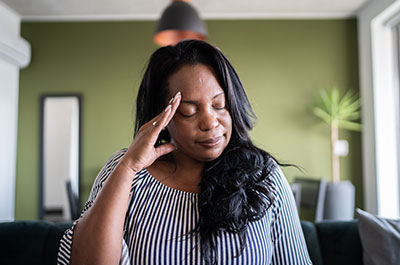Dizziness is one of the most common symptoms that brings people in to see their primary care doctor, or to an ER or after-hours clinic. It can have a number of different causes. Some are fairly harmless or temporary, like not eating enough or eating too much. But it can also be a sign of a serious health problem like heart disease or stroke. Because there are so many reasons someone may be feeling dizzy, it can be difficult for doctors – and the patients dealing with it – to get to the root of the problem and resolve it.
“Dizziness is a symptom for a host of conditions, with patients complaining of feeling lightheaded or nauseous. Other complaints include difficulty walking straight and feeling faint or about to fall,” explains Soumya Panchagnula, M.D., family medicine physician at Henry Ford Health.
And while dizziness can often be easily treated, patients have to work with their doctors to pinpoint the underlying culprit. A few possible reasons your world may be spinning:
- Vertigo. According to Dr. Panchagnula, vertigo is the most common cause of dizziness. You feel spinning, swaying or tilting or like a room moving around you. It can come on with a quick change in position (from lying to sitting or standing) or even a simple change in head position. In either case, vertigo is caused by calcium particles in the inner ear shifting during movement. This wreaks havoc on your balance and makes it difficult to maintain your equilibrium.
- Blood pressure dips. When blood is diverted away from your brain to support other bodily functions, including digestion, circulation, and even managing the body’s natural stress response, dizziness can result. So it’s not uncommon for patients with diabetes, hypertension and Parkinson’s disease – conditions associated with unstable blood pressure levels – to feel periodically lightheaded.
- Low blood sugar. If you’re not eating enough, your brain may not get the nutrients it needs to function optimally, and dizziness results.
- Dehydration. Staying hydrated is key to maintaining your equilibrium. The body needs fluid to keep blood flowing to the brain. It’s not uncommon to be dehydrated without even realizing it, especially as you get older (cues for hunger and thirst tend to wane with age). To make sure you staying hydrated, drink at least two liters of water daily and load up on water-rich fruits and vegetables.
- Chronic conditions. Psychiatric conditions, such as depression and anxiety, as well as heart and neurological conditions can also cause dizziness. So it’s important to talk to your doctor about your symptoms. “When dizziness is accompanied by symptoms such as difficulty speaking, numbness or tingling in the hands and feet or weakness in the arms and legs, stroke is always a concern,” Dr. Panchagnula says. (If you are having symptoms of stroke, call 9-1-1 and seek medical care immediately.)

Talking To Your Doctor About Dizziness
Determining the reason your world is spinning – or why you’re feeling faint or lightheaded – depends in large part on how well you’re able to describe what an episode feels like to you. Does the dizziness occur sporadically or is it constant? Does it happen on the heels of a specific trigger, such as eating (or not eating), sitting in certain positions, or standing up too quickly? How long does the sensation last and what happens over time?
“The answers to these and other questions can help your doctor identify – and often treat – the underlying condition,” Dr. Panchagnula says. Take note of when episodes occur and spend time thinking about your symptoms before you see your doctor.
Reviewed by Dr. Soumya Panchagnula, a family medicine provider who sees patients of all ages at Henry Ford Medical Center – Warren.



